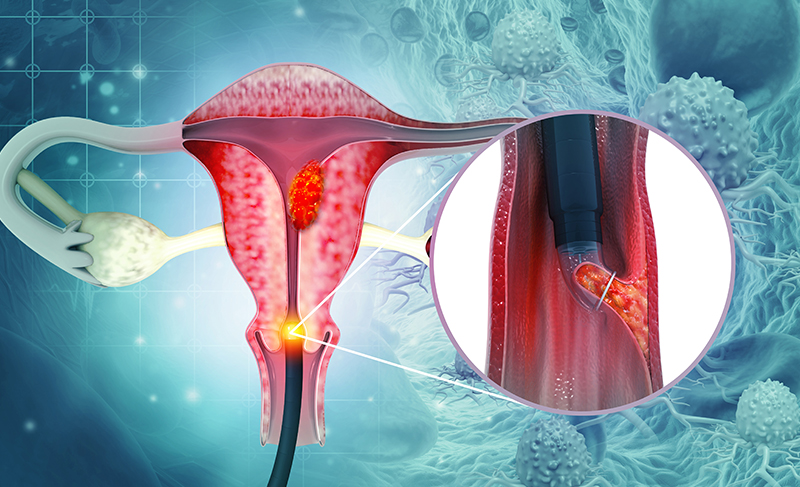The most common factor that causes cervical cancer is HPV infection, the human papillomavirus (infection transmitted sexually). It may also spread through oral, anal or vaginal intercourse. Few individuals have robust immune systems, meaning their bodies can fight a virus without awareness. Nonetheless, some people’s bodies cannot combat infection and potentially develop into malignant cells in the cervix.
Who are at Risk of Developing Cervical Cancer?
Several potential factors increase the chances of developing cervical cancer,
- Women with multiple sexual partners.
- Early intercourse
- Women above 45 years.
- Compromised immune system (HIV OR Transplant patients)
- Smoking
- Family History of cancer genes
- Lack of personal hygiene
You may not notice the symptoms in the early stages, but symptoms will arise as cancer progresses, such as,
- Watery blood-tinged vaginal discharge
- Unusual foul-smelling vaginal discharge
- Abnormal vaginal discharge
- Vaginal bleeding after intercourse
- Vaginal bleeding after menopause
- Prolonged and heavy menses
- Pain in the lower back
Screening tests help detect cervical cancer and precancerous cells in cervix that may potentially develop into cervical cancer. If cervical cancer is diagnosed, our
cervical cancer surgeon in Ahmedabad
will likely start with a thorough examination of your cervix and surrounding organs.
- Pap smear test: A Pap test is a routine screening test that can easily detect the precancerous cells and abnormal growth of cells in the cervix. Further diagnosis is mandatory if a Pap test shows abnormal cells in report such as the HPV test.
- HPV DNA test: This test examines the cells of the cervix to look for HPV infection. It detects the high-risk HPV infection most likely to develop cancer in the cervix.
- Colposcopy: The magnifying glasses equipment (colposcope) with green filters is used to examine the abnormal areas of cervix and to guide the area from where biopsy is necessary.
- Biopsy: If there is some suspicion of cancer, our doctor will examine your cervix and take some tissue samples from the cervix for a detailed probe. The tissues may be collected through punch biopsy and endocervical curettage.
The treatment for cervical cancer is determined by its severity, how far the disease has spread, types and stages of cancer, future fertility wishes, the patient’s preferences, and overall health. As a result, the treatments listed below are preferred.
- Surgery: This Surgery includes the removal of a tumor from the cervix. This technique is employed especially when cancer has not spread beyond the cervix. Some surgeries include radical hysterectomy with lymphadenectomy, pelvic exenteration, a Cone biopsy, and radical trachelectomy for fertility preservation cases. If you wish to have cervical cancer treatment in Ahmedabad by Laparoscopy then meet our expert Dr. Sandip Sonara.
- Radiation: In radiation therapy, the high-energy x-rays or other particles are used to kill the cancerous cells. Radiation treatment is only performed in advanced stages of cancer.
- Chemotherapy: This technique is used to destroy or shrink cancerous cells. Chemotherapy can be administered intravenously, orally, or in combination, depending on the patient’s stage of the disease.
- Combinations of all three options: Depending on the case, the doctor may use the combination of all three techniques, i.e., Surgery, radiation and chemotherapy.
Is there any vaccine to protect against the cervical cancer?
Yes! There is an HPV vaccine available for girls and women aged between 12 to 45. This vaccination protects against and combats the development of cervical cancer. To get the most benefit out of this HPV vaccine, get it before indulging in any sexual activity. Don’t delay to contact us if you have any queries about this.
The expertise of Sandip Sonara, gynecologic cancer surgeon in Gujarat, in treating Cervical Cancer through Laparoscopic Radical Wertheim Hysterectomy.
The standard course of therapy for cervical cancer includes the removal of the ovaries, uterus, fallopian tubes, tissues that make up the parametrium on each side of the uterus, the upper section of the vagina, and lymph nodes from the pelvis and/or abdomen (para-aortic lymphadenectomy). This type of Surgery is called radical hysterectomy, an extensive surgery compared to a typical hysterectomy. It is usually performed laparoscopically by our
gynecologic cancer specialist in Ahmedabad
.
He routinely performed complicated Radical hysterectomy (Wertheim’s hysterectomy) cases till date with a very good postoperative recovery track record. The postoperative outcome of cancer patients is the most important parameter while offering such treatment, which is the focus of Dr. Sandip Sonara,
gynecologic cancer doctor in Gujarat
.
He is one of the top
cervical cancer surgeon in Ahmedabad
. He has the credit of one of the authors for the research and development of a novel surgical technique to perform a total laparoscopic radical hysterectomy for cervical cancers, which is very popular worldwide. This technique is operated by many international surgeons nowadays.




